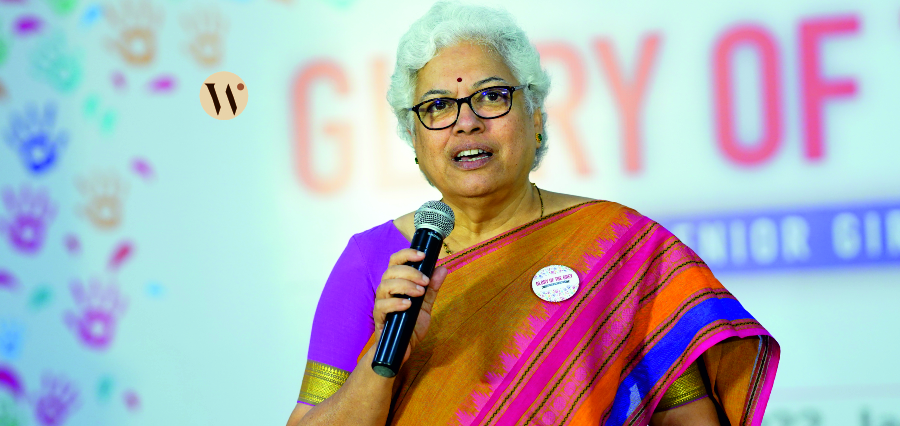The transformative power of a visionary leader can redefine the social fabric of a community. Dr Bollineni Keerthi, President of Vasavya Mahila Mandali (VMM), exemplifies this with her relentless commitment to driving social change. Leading an organization with a 55-year legacy, Dr Keerthi has positioned VMM as one of India’s premier NGOs. The organization’s mission to foster gender inclusivity and social transformation, particularly among girls and women, has made significant strides under her leadership. Reflecting on the foundation of VMM’s work, she shares, “My social enterprise works on the foundation of Gandhian ideas of nonviolence and self-reliance and her grandfather Gora’s viewpoint of humanism and self-respect.” Her dynamic leadership ensures the organization remains innovative and adaptable, embracing emerging trends in the socio-economic sector.
VMM operates with a philosophy rooted in empowerment and participation, encapsulated by the 4Cs—building confidence, fostering creativity, shaping careers, and driving change. Additionally, the organization employs a strategic framework of 4Ps: Public, Private, and People’s Participation. “The driving force is dignity and balancing humanism versus professionalism,” Dr Keerthi explains. This approach has enabled VMM to foster community engagement through participatory processes involving design, execution, monitoring, and continuous improvement. By working in complementary roles with the government, VMM pilot initiatives that conduct evidence-based advocacy and undertake impactful research using field data. With Dr Keerthi at the helm, VMM continues to redefine social impact, nurturing future generations of changemakers while championing gender equality and self-reliance.
The Origin of the #No Silence for Violence Motto
Dr Keerthi’s remarkable journey as a social impact leader is deeply rooted in her upbringing and values. Born into a family that was part of India’s freedom movement and committed to Gandhian ideals, her childhood was shaped by profound discussions on caste, religion, and equality. “My journey of childhood was observing the discussions between the family elders with people coming of various faiths and problems relating to caste, religion, and basic living,” she recalls. Immersed in community movements from a young age, Dr Keerthi participated in her grandfather’s initiatives to promote social awareness, from advocating for simple living among ministers to fostering communal harmony through inclusive gatherings. Her education at Vasavya Vidyalayam instilled in her the principles of empathy, the dignity of labour, and leadership. “Education is for knowledge building, wisdom with life skills, and to become skilful at managing work and leadership qualities,” she emphasizes.
While her early ambition was to become a doctor or a newsreader, her path shifted to professional social work, a decision influenced by her exposure to women’s development programs alongside her mother. This foundation, combined with her advanced education—including a diploma in Social Development and Leadership from Canada’s Coady International Institute and training at INSEAD Business School on Public-Private Partnerships—sharpened her ability to address societal challenges. However, it was her personal experience with severe spousal violence that galvanized her to take a stand. “Facing severe spousal violence made me think that women living in abusive relationships became very common and normalized in society. Women are not speaking up for violence,” she explains. This realization led her, in 2003, to dedicate her life to training women as changemakers and establishing a support network for those in crisis. The powerful motto #No Silence for Violence emerged from her resolve, symbolizing her mission to break the silence surrounding abuse and empower women to reclaim their lives.
Strategizing an ESG-Powered Organization
For Dr Keerthi, the success of an organization lies in its ability to anticipate trends, adapt to change, and align with evolving societal priorities. Under her leadership, Vasavya Mahila Mandali (VMM) has demonstrated a forward-thinking approach by embedding Environmental, Social, and Governance (ESG) principles into its operations. “The growing importance of ESG principles is imperative to create a more equitable and sustainable future,” she asserts. This alignment ensures that the organization remains a catalyst for positive change, setting benchmarks for transparency, accountability, and impactful service delivery.
Strategic planning is at the core of VMM’s adaptability. “We’ve been conducting strategic planning since 2012, designing five-year roadmaps with annual reviews,” Dr Keerthi shares. This process involves foreseeing market demands, understanding community needs, and aligning with government priorities. To remain ahead of industry trends, VMM invests in skilling and reskilling its teams, leverages client feedback, and periodically assesses projects with input from internal and external stakeholders. “Nonprofit policies and procedures serve as guidelines ensuring transparency, accountability, and compliance with legal and ethical standards,” she adds. By integrating ESG principles, VMM not only enhances its organizational resilience but also amplifies its mission to drive meaningful social transformation.
The Leadership of a Visionary
Dr Keerthi’s leadership at Vasavya Mahila Mandali (VMM) exemplifies the transformational power of vision, innovation, and commitment in the nonprofit sector. She believes that leadership is about creating a sense of ownership among team members and fostering a culture of dedication toward societal impact. “Human resources, i.e., the team working on various projects of VMM, own the organization by increasing their commitment and passion for reaching the last mile connectivity,” Dr Keerthi states. She emphasizes mentoring the younger generation in social entrepreneurship and inspiring youth through volunteerism. “Be the walk the talk—I practice this, and it motivates others to follow suit,” she adds.
Dr Keerthi has also integrated environmental, social, and governance (ESG) principles into VMM’s operational strategy, underscoring their relevance to organizational sustainability. “As a leader of an organization that spearheads social enterprises, I see the direct value ESG brings to long-term sustainability,” she explains. Innovative practices like Real-Time Governance (RTG) tools for data analysis and action have revolutionized VMM’s approach. “This innovation has turned data into actionable insights, aiding redesign interventions and policy changes,” Dr Keerthi notes. By introducing policies on Conflict of Interest and anti-bribery, she ensures that accountability and integrity remain central to VMM’s mission.
In her pursuit of sustainable growth, Dr Keerthi prioritizes research and partnerships with universities to bridge academic rigour with real-world impact. “Internships have a dual benefit: students conduct their thesis using VMM’s social laboratory, and VMM gains evidence-based reports for policy advocacy and resource mobilization,” she shares. Additionally, her embrace of social media strategies has amplified VMM’s visibility, helping many women in crisis access the organization’s services. “Social media has become a boon for women in crisis, so they can reach out to our Crisis Management Centre and express their agony,” Dr Keerthi explains. Her leadership reflects a harmonious blend of vision, empathy, and strategic foresight.
Balancing Social Expectations with Experience
In today’s fast-paced world, businesses across industries face the challenge of striking a delicate balance between meeting expectations and delivering innovative solutions. Dr Keerthi has mastered this art. By prioritizing customer feedback and continuously adapting to evolving needs, VMM ensures that its services align perfectly with client expectations.
One of the key strategies employed by VMM is conducting annual participatory community reviews. “This invaluable feedback mechanism allows us to identify gaps between client expectations and project deliverables,” says Dr Keerthi. By analyzing these insights, VMM is able to refine its approach and implement necessary changes to enhance the quality of its services.
Furthermore, VMM recognizes the importance of continuous learning and development. By conducting regular skill assessments and training programs, they ensure that their team stays updated with the latest industry trends and best practices. This commitment to professional growth empowers employees to deliver exceptional results and exceed client expectations.
VMM’s success story is not just about providing services; it’s about empowering communities. By fostering entrepreneurship and building strong community organizations, VMM is contributing to sustainable development and social impact. Through their support, these organizations have gained financial independence and are making a positive difference in their communities.
Dr Keerthi’s leadership and VMM’s commitment to excellence have positioned the organization as a leading force in the industry. “By striking a balance between innovation and tradition, we have created a sustainable model that benefits both clients and the community,” adds Dr Keerthi.
Setting Sustainable Goals
Dr Keerthi, a visionary leader, understands that sustainability is not just a trend but a necessity. VMM’s commitment to environmental responsibility is evident in its various initiatives. “Environment is a cross-cutting theme in our organization,” says Dr Keerthi. Furthermore, VMM’s focus on community development and social impact aligns with sustainable development goals. It has taken concrete steps towards sustainability, such as installing solar panels to harness renewable energy and implementing efficient waste management practices. By empowering local communities and promoting sustainable livelihoods, VMM is creating a positive and lasting impact on the environment and society. Also, by embracing renewable energy sources like solar power and implementing efficient waste management practices, the organization is reducing its carbon footprint and contributing to a greener future.
Creating Leaders for Social Change
In today’s rapidly evolving society, the role of leadership in fostering social change is more critical than ever. Dr Keerthi, a prominent figure in this movement, emphasizes the importance of cultivating leaders who can drive meaningful transformations within their communities. “Creating leaders for change is the pivotal task of VMM,” she states, highlighting the organization’s commitment to addressing pressing social issues. One of the most transformative initiatives undertaken by VMM is the “Mahila Mitra” project, launched in collaboration with the Vijayawada city police in January 2017.
The Mahila Mitra Initiative
The Mahila Mitra initiative aims to sensitize law enforcement and challenge patriarchal attitudes to build a more gender-equitable society. Through this project, VMM has successfully trained and empowered 160 women volunteers who actively engage in community gender sensitization efforts. These volunteers conduct meetings, provide lay counseling for domestic violence victims, prevent child marriages, and offer tele-counseling and psycho-social support to those affected by violence and COVID-19.
Dr Keerthi explains, “Mahila Mitra aims to create a value-based society with equity and equality for women and girls, providing reassurance and support during crises.” This initiative not only addresses immediate needs but also fosters long-term change by equipping women with the tools they need to become advocates for their communities.
Utilizing Technology for Community Engagement
A key aspect of Mahila Mitra’s success is its innovative use of technology. Volunteers leverage a mobile-based app and VMM’s YouTube channel to connect with communities and provide essential support. This approach demonstrates how technology can be harnessed to enhance outreach and engagement in social initiatives.
VMM believes in unconventional community engagement strategies to combat violence against women. By working at the grassroots level with female constables as coordinators at police stations, they have formed Mahila Rakshak teams dedicated to addressing harassment complaints. Dr Keerthi notes, “Through awareness campaigns and community-led interventions, Mahila Mitra aims to make Vijayawada a safer place for women.”
Expanding Impact: From Local to Statewide
The impact of Mahila Mitra has been profound. Initially piloted in Vijayawada with just 21 police stations, the initiative was reviewed in 2018 as part of a broader effort to enhance the safety and security of women and girls in Andhra Pradesh. Based on its success, Mahila Mitra was expanded into a statewide program in August 2019, reaching 1,258 police stations across the state.
The University of Edinburgh has conducted a research study on this project.
https://www.vasavya.org/images/Challenging_Gender.pdf.
Gender Equality & Women’s Empowerment Thematic Book |Civil 20 (C20) Working Group | India 2023. https://mail.google.com/mail/u/0/?ogbl#search/c20/FMfcgzGtwzrgNxkDnjjvHFTnbMLfhSNw?projector=1&messagePartId=0.1 page number: 65.
Here is the video of the project: https://www.youtube.com/watch?v=dEDD73rQJ1o&t=34s.
Owing to the good practice of Mahila Mitra, currently, VMM has collaborated with the Government of Andhra Pradesh in building the capacities towards knowledge and skills among the women’s self-help groups (SHGs) and giving handholding support for gender resource centres in addressing the violence against women and children.
Dr Keerthi reflects on this growth: “The journey from a local initiative to a statewide program underscores our commitment to creating lasting change.” This expansion signifies Mahila Mitra’s effectiveness and highlights the importance of collaborative efforts between organizations and government entities in addressing societal challenges.
Empowering Women Through Leadership Development
At the heart of VMM’s mission is the belief that empowering women is essential for fostering social change. The Mahila Mitra initiative exemplifies this philosophy by training women volunteers who become leaders within their communities. These empowered individuals are equipped not only with knowledge but also with confidence to challenge societal norms.
Dr Keerthi emphasizes that “empowering women leads to stronger communities.” By providing women with opportunities for leadership and involvement in social initiatives, VMM is cultivating a new generation of changemakers who can advocate for gender equity and social justice.
The Role of Community Engagement
Effective community engagement is crucial for any initiative aimed at creating social change. VMM’s approach involves working closely with local populations to understand their needs and challenges. This grassroots engagement fosters trust and encourages active participation from community members.
Dr Keerthi states, “We believe that real change happens when communities are involved in the process.” By prioritizing community input and collaboration, VMM ensures that its initiatives are relevant and impactful.
A Commitment to Excellence
VMM’s dedication to excellence is evident in every aspect of the Mahila Mitra initiative. From training volunteers to effectively utilizing technology, every effort is made to ensure that the program meets its goals and serves its intended purpose.
Dr Keerthi highlights this commitment: “Excellence is not just a goal; it’s a standard we uphold in all our endeavours.” This focus on quality not only enhances the effectiveness of their initiatives but also builds credibility within the communities they serve.
Looking Ahead: The Future of Social Change Leadership
As VMM continues its work through initiatives like Mahila Mitra, Dr Keerthi envisions a future where social change leadership becomes widespread. She believes that by nurturing leaders who are passionate about social justice, organizations can create a ripple effect that transforms entire communities.
“Creating leaders for social change requires investment in education, mentorship, and support,” she asserts. By fostering an environment where individuals can grow into effective leaders, VMM aims to inspire others to take action within their communities.




